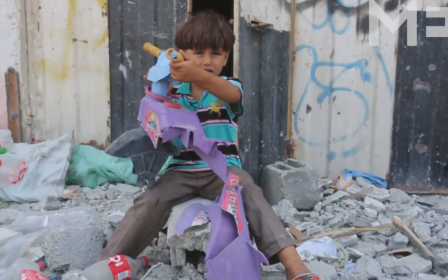The Gaza war: A caucus race

“They began running when they liked, and left off when they liked, so that it was not easy to know when the race was over,” as Lewis Carrol put it in Alice in Wonderland. He was describing the Caucus Race, but it sounds quite a lot like the Gaza War, doesn’t it? What's different is that at the end of the Caucus Race, the Dodo Bird declared: “Everybody has won, so all must have prizes.”
After 10 days of more-or-less ceasefire, they’re at it again. In the first 24 hours, 137 Palestinian rockets were launched at Israel (no casualties), and 92 Israeli air strikes hit Gaza (11 dead). That’s pretty small beer in a war that has already killed more than 2,000 people, but they literally don’t know how to stop, and the Dodo Bird is no help at all. The fact is that nobody has won, so nobody can have prizes.
That’s what the negotiations in Cairo were actually about: prizes. Hamas’s leaders in Gaza were demanding an end to the Israeli blockade of the territory and the opening of air and sea ports in the Gaza Strip. They also wanted over 200 Hamas members in the West Bank who had been arrested just before the start of this war to be released. They might as well have asked for the Moon.
Hamas has fired almost 6,000 of its homemade rockets at Israel since the start of the war, but it has killed only two Israeli civilians (plus one Thai guest-worker). It is not even a serious danger to Israel, let alone an existential threat. So why would any sane Palestinian negotiator think that Israel would feel compelled to make major concessions to Hamas?
The Israeli negotiators were equally deluded. They understandably dismissed all of Hamas’s demands, but then they made equally ludicrous demands of their own. They wanted Hamas and all other militant Palestinian organisations in the Gaza Strip to be completely disarmed. That would not only end any possibility that the Palestinians could exert military pressure on Israel; it would also quite soon end Hamas’s rule in the Gaza Strip.
Why would Hamas agree with that? Over 2,000 people have been killed and more than 8,000 injured by Israel’s strikes on the Gaza Strip, but that’s less than one percent of the population. Moreover, when the Israeli army actually invaded Gaza on the ground (to destroy the famous “terror tunnels”), Hamas fighters managed to kill 64 Israeli soldiers.
That was a particularly futile waste of Israeli lives, since it is hard to believe that 64 of Israel’s troops would ever have been killed by random Hamas fighters coming out of undiscovered tunnels from time to time. Ordinary Israelis, with nightmare visions of terrorists popping up in their gardens, have bought the official line that the sacrifice was worthwhile, but none of the tunnels actually extended more than a couple of kilometres beyond Gaza’s border.
The Palestinians doubtless think that killing more Israeli soldiers than in the previous two wars combined was some sort of success, even if they lost many more fighters themselves, but in the real world it does not give them any military advantage. So no concessions from either side of any kind.
This was quite foreseeable from the first day of the war, because that’s the way the last two wars ended too. They have all been fought mainly to serve the domestic political interests of the two governments, rather than to force real concessions out of the other.
Hamas’s strategic situation is peculiar: it is very weak and cannot hurt Israel, but it is virtually indestructible. Israel can hammer the population of the Gaza Strip as much as it likes, but that will only strengthen their support for Hamas. Whereas Israel is enormously powerful, but cannot defeat Hamas unless it is willing to re-occupy the Gaza Strip - which would lead to a steady and ultimately intolerable drain of casualties among the occupying Israeli troops.
The moves in this relationship are therefore as stately and predictable as a minuet. When Hamas is under political pressure at home and needs a distraction, it launches a few rockets at Israel or provides some other provocation that the Israeli government cannot ignore. Then the Israeli government, under irresistible domestic pressure to “do something”, launches some air-strikes, and the dance of death recommences.
Stopping is more difficult, because there’s no music to give you the signal by coming to an end. In terms of domestic politics, both sides have already accomplished what they came for – but since neither can acknowledge publicly that that’s all the war was really about, they end up raising wholly unrealistic demands at the ceasefire talks. That’s why the negotiations in Cairo ended in failure: nobody has won, so nobody can have prizes.
Now that the shooting has started up again, there may be a few more hundred deaths – but probably not another thousand, because the fighting really is going to end soon. It just won’t end with a political deal, and perhaps not even with a formal cease-fire. More likely it will just sort of peter out, like these things sometimes do. Until next time.
- Gwynne Dyer is an independent journalist whose articles are published in 45 countries.
The views expressed in this article belong to the author and do not necessarily reflect the editorial policy of Middle East Eye.
Photo Credit: Israeli air strikes ignite in the centre of Gaza City (AFP)
Middle East Eye propose une couverture et une analyse indépendantes et incomparables du Moyen-Orient, de l’Afrique du Nord et d’autres régions du monde. Pour en savoir plus sur la reprise de ce contenu et les frais qui s’appliquent, veuillez remplir ce formulaire [en anglais]. Pour en savoir plus sur MEE, cliquez ici [en anglais].





